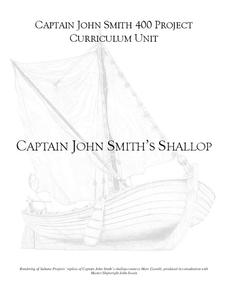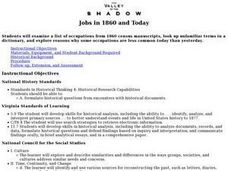Curated OER
William Shakespeare: "The Bard"
Blanket, gossip, assassination, champion, generous. What do these words have in common? They were all coined by Shakespeare (or was it Shackespe, Shaxberrd, or Shake-Speare?) and are still in use today. Fustilarian, trundletail,...
Curated OER
Word Origins
Discuss where some words originated, how they are used today, and new words recently added to the dictionary. This short slide show is lacking in depth but could possibly work as a review.
National Endowment for the Humanities
People and Places in the North and South
North and South: two opposite directions and two opposite economic and social systems in time of the Civil War. Pupils peruse census websites and primary source photographs to understand what life was like for the everyday person before...
Curated OER
Captain John Smith's Shallop
Young explorers, all aboard the shallop to discover how early European explorers would navigate the American coastline to find resources, map terrain, and trade with Native American tribes.
California Academy of Science
Coral and Chemistry
Using cabbage juice as a pH indicator, future scientists explore the effect of increasing carbon dioxide on the pH of the ocean and relate it to the health of coral reefs. Ideal for an earth or environmental sciences course, this lesson...
Humanities Texas
Primary Source Worksheet: Theodore Roosevelt, Excerpt from “The Square Deal” Speech
Talk about a timely resource! As part of a series of primary source exercises, individuals read and respond to questions about Theodore Roosevelt's "The Square Deal" speech. Roosevelt reminds us of what our social system should be.
Roy Rosenzweig Center for History and New Media
Differences Among Colonial Regions
Classes look at and analyze primary source images to explore the differences between the colonial regions during the Revolutionary era. They break into groups to tackle each region and then present their findings to the class. A final...
Global Oneness Project
Far From Home
A timely and provocative lesson inspires high schoolers to tackle the Syrian refugee crisis. They analyze a compelling photo essay before discussing and writing about it.
Heritage Foundation
The Senate
Do your learners struggle to understand the differences between the Senate and the House of Representatives? Help them develop an understanding of how the US Constitution's clauses affect the Senate's operations. A high-quality social...
Heritage Foundation
Lawmaking and the Rule of the Law
How many constitutional clauses does it take to create a bill? High schoolers find out with several activities and selected clauses about the rule of law and the US Constitution. Various coinciding activities help to strengthen learning.
Heritage Foundation
The Office of the Executive
An executive is not just a leader of a company; you can also use the term to describe the president of the United States. The ninth part of a 20-part unit teaches high schoolers about the importance of the executive branch and the...
National History Day
A Clever War: Scientific and Technological Advances in World War I
Technology—changing lives and transforming war. Your tech-loving historians examine photographs and primary documents to explore how technology changed not only World War I, but also how it moved society forward. They apply their...
PBS
Women's History: Parading Through History
Want to teach your pupils about debate, effective speech techniques, propaganda, and the women's movement? The first in a sequential series of three, scholars analyze real propaganda images from the the historic women's movement, view a...
Curated OER
Social Studies: Families Today and Yesterday
Students examine past and contemporary family life. Using Venn diagrams, they compare and contrast the two and write short statements about them. Among the areas for consideration are clothing, food, transportation, and traditions.
Curated OER
How is the Media Dealing With Cancer in Our Society Today?
High schoolers identify people in the news media who have admitted they suffer from cancer. They explain the types of treatments for each cancer mentioned. They work together to discuss their findings.
Curated OER
History Today
Young scholars use the newspaper to determine how history is being made in your community, region or country.They identify the different components that comprise a newspaper. This lesson contains adaptations from elementary to high school.
Curated OER
Tim the Turtle Takes Two Turns Today
First graders examine the way their mouths move when making the /t/ sound at the beginning and middle of a word. Next, they recite a tongue twister and write the letter. They listen to "A Cat Nap," discuss the story, and write a message...
Curated OER
The First Americans Today
Fourth graders identify at least one similarity and at least one difference in the following categories: celebrations, daily activities, values and beliefs, other.
Curated OER
Africa South of the Sahara Today
Students describe and analyze cultural exchange projects that link students in all parts of the world. They write a report about the Ghana project of Morgan City High School.
Curated OER
What Did I Learn Today?
Students are given a calender to take home and show their parents what they learned during the day. They write sentences and draw pictures for their calendar. They are able to keep their parents aware of what is happening at school.
Curated OER
Jobs in 1860 and Today
Students compare occupations during the 19th century with the 21st century using information from 19th century census information.
Curated OER
Is Cancer on the Rise or Decline in America Today?
Learners read an article about cancer in the United States. They research a cancer of their choice along with possible treatments. They identify types of cancer that are on the rise and decline for both men and women. They examine the...
Curated OER
What Can We Do Today?
Students practice rereading selected passages to improve their reading fluency. Working in pairs, students read and reread decodable, leveled passages fluently and with expression. They are assessed by their partner, using a fluency...
Curated OER
I Am Here Today
Students learn the letters in their name and the order of the letters to make their name.
Other popular searches
- Today I Feel Silly
- Native Americans Today
- African Americans Today
- Southeast Asia Today
- Have You Filled a Bucket Today
- Today Is Monday
- China Today
- Caste System Today
- Yesterday Today and Tomorrow
- Yesterday Today Tomorrow
- Bison Today
- Comparisons to Today

























